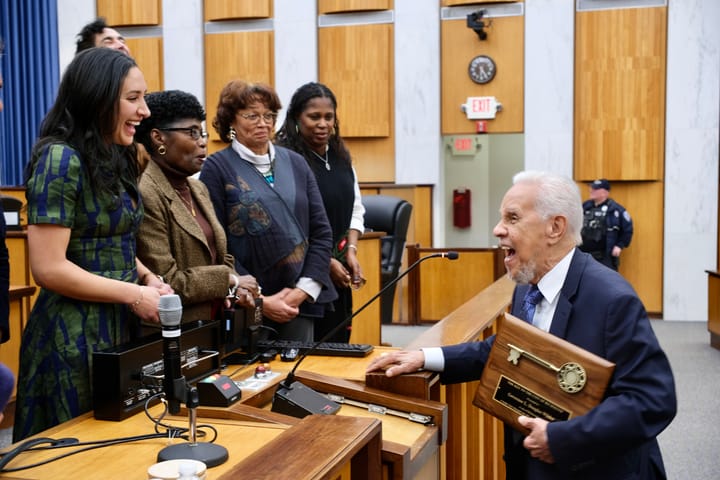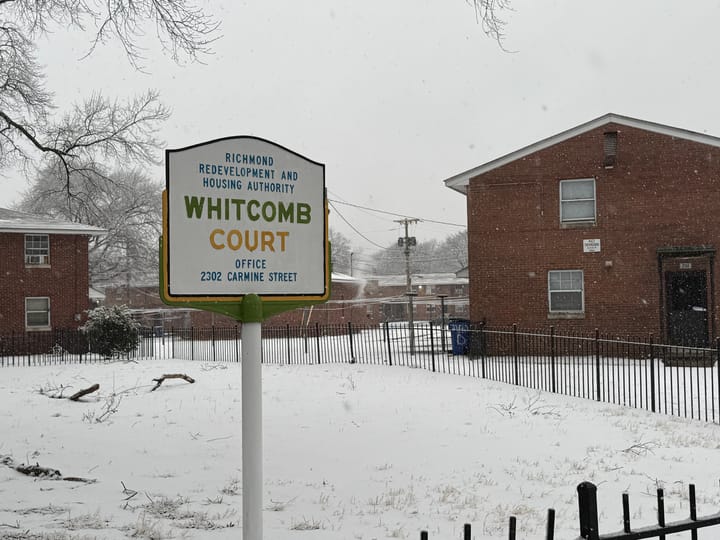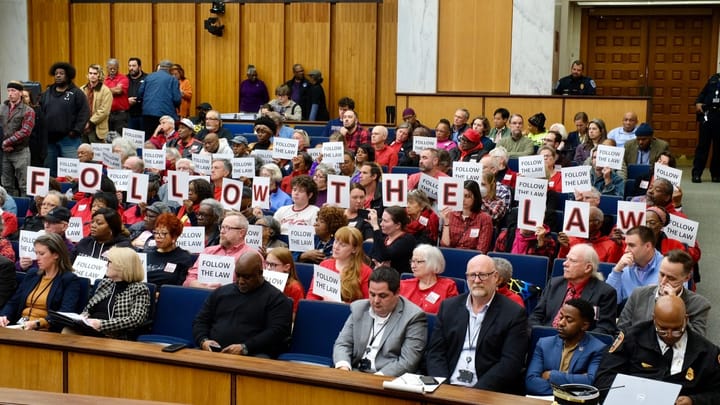
City’s lawyers say there’s no backup of lost phone at issue in former FOIA officer’s suit
Several months after she was named a defendant in a lawsuit related to transparency at Richmond City Hall, former city spokesperson Petula Burks reportedly lost her city-issued phone in an airport.
In a new court document, attorneys representing Burks and the city revealed there was no digital backup made of the phone that went missing, even though the city was already on notice it was being sued.
“The city does not have cloud-based storage of Petula Burks’s cell phone,” W. Ryan Waddell with the Ogletree Deakins law firm wrote in an Oct. 29 report filed with the judge overseeing the case. Ogletree is a private firm representing the city in the case.
Lawyers for Connie Clay — who is suing Burks and the city after being fired in early 2024 from her former job as the city’s Freedom of Information Act officer — have been trying to assemble a record of text messages by city officials that might shed light on the reason Clay was fired.
After learning there was no backup created for the lost device, Clay’s lawyers filed a motion last week asking the court to formally rule that the city has spoiled evidence that should’ve been preserved.
“The City of Richmond and Petula Burks should have disclosed the truth about the city-issued cell phones long ago,” Clay’s lawyers wrote in the Nov. 5 spoliation motion. “But details have only been slowly released over time while the story constantly changed.”
Clay alleges the city violated Virginia’s whistleblower laws by firing her after she raised concerns that the city wasn’t complying with FOIA, which generally requires the city to release non-sensitive public documents when someone asks for them. The city is arguing Clay was fired for not getting along with co-workers and insisting that her own interpretations of FOIA were correct regardless of what higher-ranking city officials had decided.
As the city’s former communications chief, Burks was Clay’s boss. That meant Burks played a key role in the firing and in internal discussions over how to handle FOIA requests from the news media and others.
Circuit Court Judge Claire G. Cardwell has not yet ruled on the motion alleging spoiled evidence, and it’s not yet clear how significant it could be to the outcome of the case set to go to trial next summer.
However, Clay’s attorneys have said throughout the case that the apparently faulty handling of cell phones could raise larger questions about whether the city is complying with laws requiring public records to be retained. Even if the phone was accidentally lost, they argue, the city’s failure to preserve a copy was “reckless” because it happened in June of 2024 when the city had known since that March that Burks was being sued.
Clay filed her lawsuit on March 1. On March 6, according to court documents, the city issued a document preservation notice for employees who might have records relevant to the case. The city also asked IT staff for a “litigation audit” to find relevant records from the time period in question.
The city could have preserved the contents of the phone, Clay’s attorneys wrote, by taking screenshots of the texts or making a digital copy, a process they said should be familiar to “anyone who has completed the transition from one iPhone to a new iPhone on the same Apple ID).”
When asked if the city makes digital backups of employees’ phones, city officials acknowledged they do not.
“The city does not create full digital backups of staff cellphones,” said spokesperson Mira Signer. “While this has been a longstanding practice at the city, it runs counter to Mayor Danny Avula’s commitment to building a more transparent government. The mayor and his administration will investigate ways to preserve text messages in the case of a lost cellphone.”
Text messages from officials dealing with public business are subject to Virginia’s FOIA laws, which means local governments have a duty to preserve them regardless of whether they’re connected to a lawsuit.
Cardwell had already reviewed what she believed to be Burks’ city phone after a prior dispute about whether the city had properly searched for text messages related to Clay. It was only after that judicial review that the city’s attorneys said Burks’ original phone had been lost, a revelation that seemed to take the judge by surprise. The phone the judge looked at was mostly blank because it was a new one Burks received just before she left City Hall in July of 2024.
The judge instructed the city to deliver a more comprehensive report on everything it had done to search for electronic records, including efforts to retrieve digital copies of anything on the missing phone.
It was the city’s response to that court order that revealed there was no digital backup either.
Clay’s attorneys — Sarah Robb and Helen Hardiman — are asking the judge to approve a formal instruction telling future jurors they should assume there was relevant evidence on the phone that would’ve helped Clay.
The city’s attorneys have characterized the ongoing search for text message evidence as an irrelevant distraction, insisting no documents have been concealed and everything the city has has been turned over to Clay’s team. Because text messages between city employees would exist on multiple phones, they’ve argued, the loss of Burks’ phone isn’t a major issue with the evidence in the case.
In his report to the judge, Waddell affirmed that the city’s legal team “is not withholding any relevant documents or information” related to any of the unresolved disputes over evidence.
The judge also ordered the city to search the city-issued phones of former finance director Sheila White and former chief administrative officer Sabrina Joy-Hogg to search for any messages Burks may have sent them about Clay. The city’s lawyers said they found just one text message between Burks and White, though it doesn’t appear to be particularly relevant to Clay’s allegations.
In its latest filing, Clay’s team noted the city had numerous opportunities to disclose the lost phone issue but instead strongly disputed the idea there could be any missing evidence.
“Defendants sent plaintiff on a months-long goose chase for simple text messages, giving responses in discovery and to the court making no mention of Burks’ nearly-blank cell phone, emphasizing that nothing had been deleted, stating that ‘professionals do not text,’ and, even the day before announcing (without documentation or other proof) that Burks lost her cell phone in a New York airport, called plaintiff’s requests for text messages ‘the same tired argument,’” Clay’s attorneys wrote.
The text message dispute was one of several unanswered questions that led the judge to call off a trial that was supposed to happen in September and reschedule it for June of 2026. The judge said she faulted both sets of attorneys for the delay.
The motion for a spoiled evidence finding could potentially be taken up at a hearing in the case set for Nov. 18.
A battle over the filing itself?
The document the city provided to the judge in late October wasn’t initially part of the publicly accessible file in the case. That could be because it was a sworn statement of facts in response to Cardwell’s questions in open court, not a legal motion to be argued over.
Clay’s attorneys attached the city’s report to their motion, pointing to the lack of a digital copy as a sign of the city’s alleged recklessness with evidence.
After The Richmonder sent an email on Nov. 6 asking city representatives for a response to the Nov. 5 filing about the phone, Ogletree attorney Jimmy F. Robinson Jr. called this reporter. Instead of offering a comment on the city’s behalf, he asked how the media knew about the filing.
Robinson has already raised several objections to news coverage of the case, which has unfolded via public court filings, public courtroom battles and FOIA requests that require the city to produce public records.
At some point on Nov. 6, the motion about spoiled evidence was removed from the publicly accessible case file available at the city courthouse, an indication the judge had at least temporarily sealed it. By Nov. 7, the filing was publicly available again.
What happened behind the scenes to cause that change isn’t fully clear.
In an email Tuesday, Robinson indicated the city did nothing to attempt to have the document stricken from the public record.
“There was no dispute between the parties as to whether the filing should have been sealed,” Robinson wrote. “Also, the ‘city’s legal team’ did not ask Judge Cardwell to seal the spoliation filing or any of its contents or to take any action whatsoever.”
Robb, the lead attorney for Clay, said “this is a case about transparency.”
“The records we’ve requested should have been preserved and our positions are laid out in the motion,” Robb said. “Our understanding is that our motion is currently in the court’s file in the public record. We see no reason that it should not be.”
Contact Reporter Graham Moomaw at gmoomaw@richmonder.org






